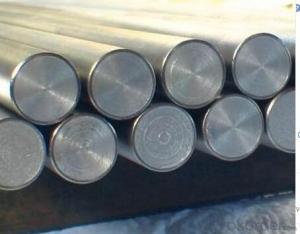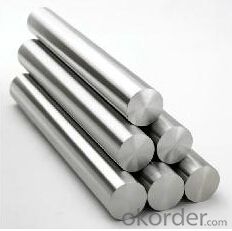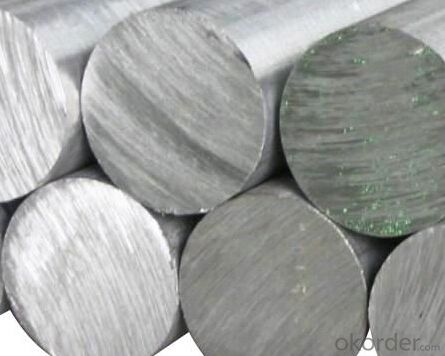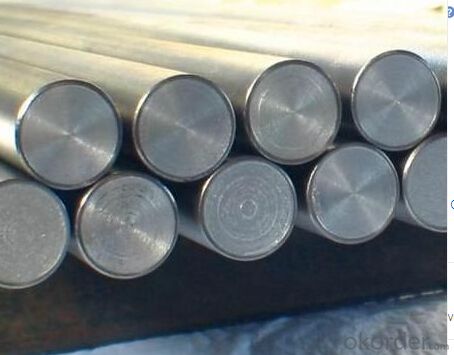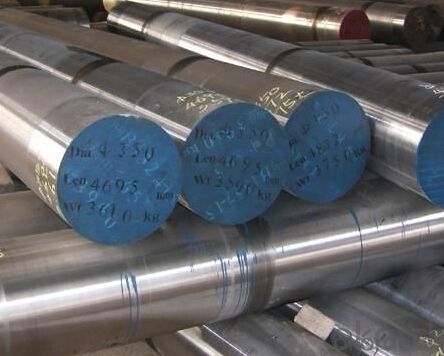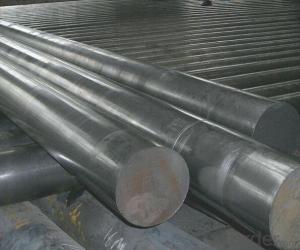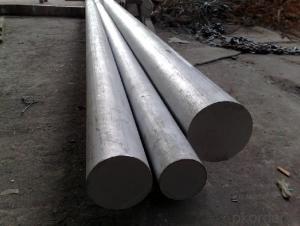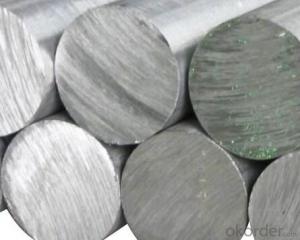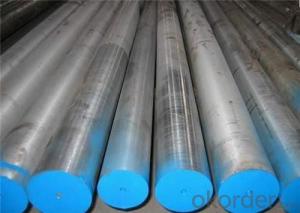Grade SAE51200/ GCr15 / 100CR6 Bearing Steel
- Loading Port:
- Tianjin
- Payment Terms:
- TT or LC
- Min Order Qty:
- 500 m.t.
- Supply Capability:
- 100000 m.t./month
OKorder Service Pledge
OKorder Financial Service
You Might Also Like
Product Description:
OKorder is offering Grade SAE51200/ GCr15 / 100CR6 Bearing Steel at great prices with worldwide shipping. Our supplier is a world-class manufacturer of steel, with our products utilized the world over. OKorder annually supplies products to European, North American and Asian markets. We provide quotations within 24 hours of receiving an inquiry and guarantee competitive prices.
Product Applications:
Grade SAE51200/ GCr15 / 100CR6 Bearing Steel are ideal for structural applications and are widely used in the construction of buildings and bridges, and the manufacturing, petrochemical, and transportation industries.
Product Advantages:
OKorder's Grade SAE51200/ GCr15 / 100CR6 Bearing Steel are durable, strong, and resist corrosion.
Main Product Features:
· Premium quality
· Prompt delivery & seaworthy packing (30 days after receiving deposit)
· Corrosion resistance
· Can be recycled and reused
· Mill test certification
· Professional Service
· Competitive pricing
Product Specifications:
1. Dimensional sizes: Thickness: 14~100mm.Length:3000~5800mm,Diameter :14-500mm
2.Chemical composition:
C | Si | Mn | Cr | Ni | Cu |
Equal or less than | |||||
0.95-1.05 | 0.15-0.35 | 0.20-0.40 | Cr:1.30-1.65 | 0.30 | 0.25 |
3. Grade: SAE51200/ GCr15 / 100cr6
4. Heat Treatment:
Soft annealing: heat to 680-720°C, cool slowly.
Hardness after annealing: Max. 241 HB
Hardening: 820 - 850 °C
Normalizing temperature: 840-880°C
Tempering: 540-680°C
5. Surface requirements: Black, grinding, bright, polish
6. Characters:
1) Comprehensive properties
2) Good performance in cutting and processing after spheroids annealing
3) High hardness and homogenization after quenching and tempering
4) High abrasive resistance and fatigue resistance
7. Payment terms: T/T or L/C at sight
Usage & Applications of Bearing Steel GCr15
Our products have been used in all kinds of areas, such as aviation, aerospace, navigation, nuclear, energy, chemical industry, electronic information, petrochemical, automotive, instrument and meter, Communication ,transportation, and medical instruments, etc. Bearing ring,steel rolling mill ,machinery, 100Cr6 bearing steel ball is widely used in high-speed and low-noise bearing, bicycle, motorcycle, automobile, bags, electronics.
Packaging & Delivery of Bearing Steel GCr15
Mark: Heat No. will be cold stamped and Steel grade, diameter (mm), length (mm), and the manufacturer LOGO and weight (kg) is painted.
Standard seaworthy packing or as customer required
Delivery time: Within 30 days after order is confirmed.
FAQ:
Q1: Why buy Materials & Equipment from OKorder.com?
A1: All products offered byOKorder.com are carefully selected from China's most reliable manufacturing enterprises. Through its ISO certifications, OKorder.com adheres to the highest standards and a commitment to supply chain safety and customer satisfaction.
Q2: How do we guarantee the quality of our products?
A2: We have established an advanced quality management system which conducts strict quality tests at every step, from raw materials to the final product. At the same time, we provide extensive follow-up service assurances as required.
Q3: How soon can we receive the product after purchase?
A3: Within three days of placing an order, we will begin production. The specific shipping date is dependent upon international and government factors, but is typically 7 to 10 workdays.
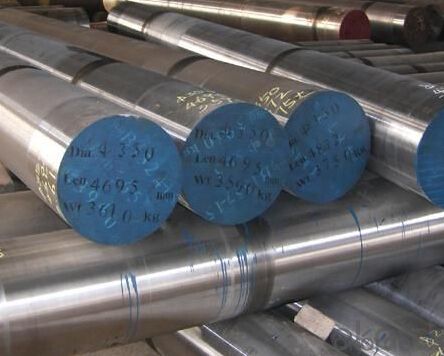
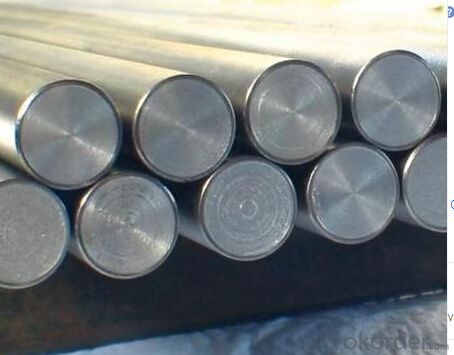
- Q: How does special steel perform in stamping applications?
- The unique properties of special steel make it an excellent choice for stamping applications. Its high strength and durability ensure that it can withstand wear and tear during the stamping process, resulting in longer tool life and reduced maintenance costs. Additionally, special steel's heat resistance allows it to maintain its structural integrity even at high temperatures, preventing warping or deformation. Its exceptional dimensional stability ensures precise and consistent results, while its excellent formability allows for the creation of intricate designs. Overall, special steel's properties make it a reliable and versatile option for a wide range of stamping applications.
- Q: How does special steel contribute to the strength of products?
- Special steel contributes to the strength of products through its unique composition and manufacturing process. By incorporating specific alloys and heat treatments, special steel enhances the material's durability, toughness, and resistance to wear and corrosion. This increased strength allows products made from special steel to withstand higher loads, pressures, and extreme conditions, making them more reliable and long-lasting.
- Q: How does special steel contribute to the defense equipment industry?
- Special steel plays a crucial role in the defense equipment industry by offering superior strength, durability, and performance characteristics that are essential for producing high-quality military equipment. This type of steel is specifically engineered to meet the demanding requirements of defense applications, ensuring the safety and effectiveness of military personnel and operations. One of the key contributions of special steel to the defense equipment industry is its ability to withstand extreme conditions and environments. Military equipment often operates in harsh conditions, including extreme temperatures, high pressures, corrosive environments, and impact forces. Special steel is designed to maintain its structural integrity and performance under these challenging conditions, providing a reliable and long-lasting solution for defense equipment. Moreover, special steel offers exceptional strength and toughness, making it ideal for manufacturing armored vehicles, tanks, and military aircraft. It provides a high level of protection against ballistic threats and can withstand projectile impacts and explosions. The use of special steel in defense equipment ensures the safety of military personnel and enhances their survivability in combat situations. Additionally, special steel is essential for the production of cutting-edge weaponry and munitions. It is used in the manufacturing of firearms, missiles, and artillery systems due to its excellent mechanical properties and ability to withstand high pressures. Special steel also enables precision engineering, ensuring the accuracy and reliability of military firearms and projectiles. Furthermore, special steel contributes to the defense equipment industry by supporting technological advancements. As technology continues to evolve, the defense sector requires materials that can meet the demands of modern warfare. Special steel can be tailored and optimized to meet specific performance requirements, allowing for the development of advanced defense systems such as stealth technology, electronic warfare, and precision-guided munitions. In conclusion, special steel plays a pivotal role in the defense equipment industry by providing the necessary strength, durability, and performance characteristics required for military applications. It ensures the safety and effectiveness of defense personnel and equipment, withstands extreme conditions, enables the production of advanced weaponry, and supports technological advancements in the defense sector.
- Q: How does special steel contribute to the magnetic properties of products?
- Special steel contributes to the magnetic properties of products through its unique composition and structure. Special steel, also known as alloy steel, contains specific elements such as nickel, chromium, manganese, and molybdenum, which alter its magnetic behavior. These elements can enhance or suppress the magnetism of the steel, depending on the desired application. For example, when nickel is added to steel, it increases its magnetic permeability, making it more receptive to magnetic fields. This property is particularly useful in applications like transformers, where the steel core needs to efficiently conduct magnetic flux. Similarly, the addition of other magnetic elements like cobalt or iron can also enhance the magnetic properties of special steel. On the other hand, certain elements can reduce or eliminate the magnetic properties of steel. Chromium, for instance, is known for its anti-magnetic characteristics. By adding chromium to steel, it can decrease its magnetic permeability, making it suitable for applications that require non-magnetic qualities, such as medical equipment or electronics. Furthermore, the structure of special steel also plays a crucial role in its magnetic properties. Through various heat treatment processes, the steel's crystalline structure can be manipulated, affecting its magnetization. For instance, by annealing the steel, the crystal grains can be made larger, reducing its magnetization. Conversely, cold working or quenching the steel can lead to a finer grain structure, enhancing its magnetic properties. In summary, special steel contributes to the magnetic properties of products by incorporating specific elements that either enhance or suppress magnetism, depending on the application requirements. Additionally, the steel's structure can be modified through heat treatments, further influencing its magnetization. The ability to tailor the magnetic properties of special steel makes it a valuable material for various industries, including telecommunications, energy, and electronics.
- Q: Can special steel be used in the oil and gas equipment manufacturing industry?
- Yes, special steel can be used in the oil and gas equipment manufacturing industry. Special steel, such as stainless steel or alloy steel, offers high strength, corrosion resistance, and durability, making it suitable for various applications in the oil and gas sector. It is commonly used in the manufacturing of pipes, valves, fittings, and other critical components that can withstand harsh operating conditions and prevent leakage or failure.
- Q: Can special steel be coated?
- Yes, special steel can be coated. Coating special steel provides several benefits such as corrosion resistance, improved aesthetics, increased durability, and enhanced functionality. There are various coating materials and techniques available for special steel, including but not limited to electroplating, hot-dip galvanizing, powder coating, and ceramic coating. These coatings help protect the steel from environmental factors, chemical exposure, and wear and tear, thereby extending its lifespan and maintaining its performance. Additionally, coatings can also be customized to provide specific properties like non-stick surfaces, heat resistance, or anti-microbial properties, depending on the intended application of the special steel.
- Q: How does case-hardening steel achieve high surface hardness?
- Case-hardening steel achieves high surface hardness through a process called carburizing, where the steel is heated in a carbon-rich environment. This causes carbon atoms to diffuse into the surface of the steel, creating a high concentration of carbon. The carbon atoms then form carbides, which are very hard and increase the steel's surface hardness.
- Q: What are the requirements for special steel used in power generation equipment manufacturing?
- The requirements for special steel used in power generation equipment manufacturing are quite stringent. First and foremost, this type of steel must possess high strength and durability to withstand the extreme operating conditions and loads experienced in power generation equipment. This includes withstanding high temperatures, pressure, and mechanical stress. Additionally, special steel used in power generation equipment must exhibit excellent resistance to corrosion and oxidation. As power generation equipment often operates in harsh environments, such as high humidity or exposure to corrosive substances, the steel must have a high level of resistance to ensure its longevity and performance. Furthermore, the steel used in power generation equipment must have good weldability and formability. This is crucial for the manufacturing process, as complex shapes and structures are often required in power generation equipment, and the ability to weld and form the steel accurately is essential. Another important requirement for special steel in power generation equipment is its ability to maintain its mechanical properties at elevated temperatures. Power generation equipment, such as boilers or turbines, operates at high temperatures, and the steel used must retain its strength, creep resistance, and dimensional stability under these conditions. Lastly, special steel for power generation equipment must conform to industry standards and specifications. These standards ensure the quality, reliability, and safety of the steel used in power generation equipment manufacturing. Compliance with these standards is crucial to ensure the performance and longevity of the equipment. Overall, the requirements for special steel used in power generation equipment manufacturing are demanding, encompassing high strength, durability, resistance to corrosion and oxidation, good weldability and formability, heat resistance, and compliance with industry standards. Meeting these requirements is vital to ensure the efficient and reliable operation of power generation equipment.
- Q: How does special steel contribute to the manufacturing of molds and dies?
- Special steel plays a crucial role in the manufacturing of molds and dies due to its exceptional properties such as high hardness, wear resistance, and toughness. These characteristics enable special steel to withstand the extreme pressures, temperatures, and abrasive forces involved in the molding and die casting processes. By using special steel in the production of molds and dies, manufacturers can ensure longer tool life, improved dimensional accuracy, and enhanced surface finish, ultimately leading to higher productivity and quality in the manufacturing industry.
- Q: What are the different surface protection methods for special steel?
- There are several surface protection methods available for special steel, each with its own advantages and applications. Here are some of the most common methods: 1. Coating: Coating is a widely used method to protect the surface of special steel. This can involve applying a layer of paint, powder coating, or electroplating. Coatings provide a barrier between the steel and the environment, preventing corrosion and enhancing the aesthetics of the steel surface. 2. Galvanization: Galvanization involves coating the special steel with a layer of zinc through a process called hot-dip galvanizing. This method provides excellent corrosion resistance and is commonly used for outdoor structures and equipment exposed to harsh environments. 3. Passivation: Passivation is a chemical process that removes surface contaminants and forms a protective oxide layer on the special steel's surface. This method improves the steel's resistance to corrosion and is often used for stainless steel. 4. Nitriding: Nitriding is a heat-treatment process that diffuses nitrogen into the surface of the special steel, forming a hard and wear-resistant layer. This method enhances the steel's durability, resistance to fatigue, and corrosion resistance, making it suitable for applications involving heavy loads or abrasive environments. 5. PVD and CVD coatings: Physical Vapor Deposition (PVD) and Chemical Vapor Deposition (CVD) are methods used to deposit thin films of various materials onto the special steel surface. These coatings can provide enhanced hardness, wear resistance, and low friction properties, making them ideal for cutting tools, molds, and high-performance applications. 6. Shot peening: Shot peening is a mechanical surface treatment method that involves bombarding the special steel surface with small spherical particles. This process induces compressive stresses in the steel, improving its fatigue life, resistance to stress corrosion cracking, and wear resistance. 7. Anodizing: Anodizing is a process used primarily for aluminum, but it can also be applied to some special steel alloys. By creating an oxide layer on the surface, anodizing improves corrosion resistance and allows for the application of decorative finishes. Each of these surface protection methods offers unique properties and benefits, and the choice of method depends on the specific requirements of the special steel application.
Send your message to us
Grade SAE51200/ GCr15 / 100CR6 Bearing Steel
- Loading Port:
- Tianjin
- Payment Terms:
- TT or LC
- Min Order Qty:
- 500 m.t.
- Supply Capability:
- 100000 m.t./month
OKorder Service Pledge
OKorder Financial Service
Similar products
Hot products
Hot Searches
Related keywords


